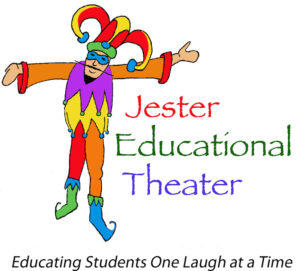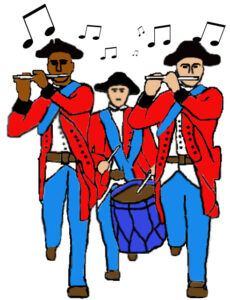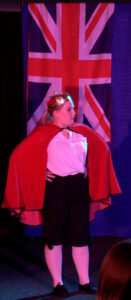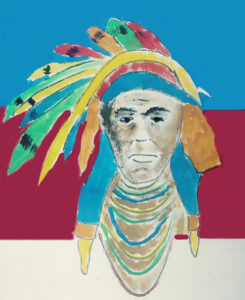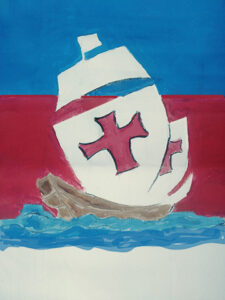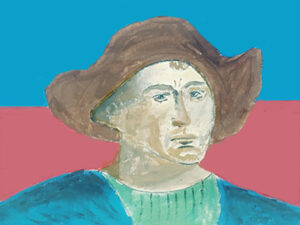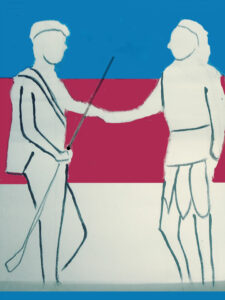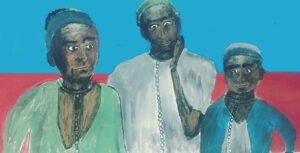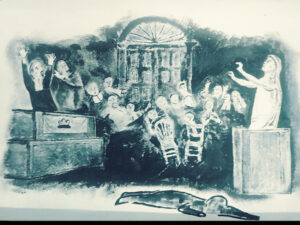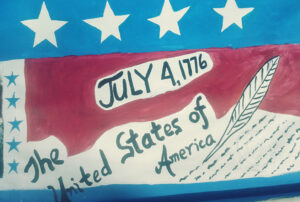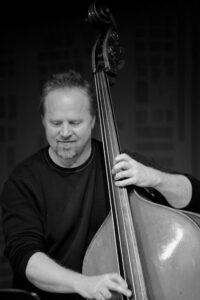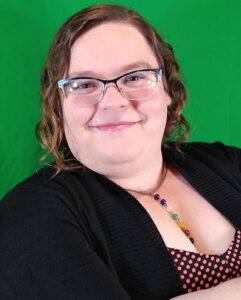Presents
Book, Music, and Lyrics by Kevin Muir
Direction, Conducting, and Musical Arrangements by Leander Hastings
Choreography by Kristin Alarcon
All images copyright 2022, Jester Educational Theater
“The Revolutionary Revue” is a show about the time when America was a part of England. It’s one hour of music, dance, drama, and comedy describing life in the 13 colonies and the events that led to the founding of our nation.
Here are two Major Players in our Tale: Uncle Sam and King George.
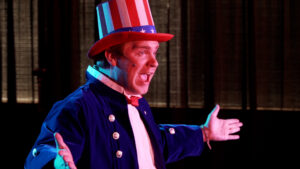
Uncle Sam: Is he really an uncle?
King George the Third, King of England and Ruler of the American Colonies: madman, or just mad?
As you watch the musical, be sure to track the action of the story by following along with the pictures on the painted backdrop you see below–this reads like a book from left to right, top to bottom. The pictures tell the same story you will see on stage.
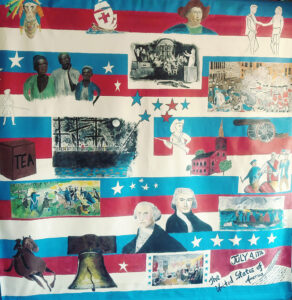
Quick Fact: Francis Scott Key wrote the poem that became the lyric for our national anthem, “The Star Spangled Banner.”
The First Inhabitants of these Lands
People have lived here on these two continents for a long, long time–thousands of years at least. Native American legend says they have been here forever. There are many sources of information about Native Americans; one good source is to talk with a person who has tribal connections and learn from them, and if you yourself have tribal connections, you have a chance to share about your heritage!
European Exploration and the Age of Discovery
In the 1400s, Europe began sending maritime explorers to see what this planet looks like. These explorers sailed out into the Atlantic Ocean heading in all directions, but mostly west and south. Many explorers were looking for an ocean route to Asia. Europeans knew they could walk to Asia, but it was a long, hard, and increasingly dangerous trip, so they thought maybe sailing would be easier or less dangerous. But they didn’t actually know how to get to Asia at first. It was a mystery.
Christopher Columbus
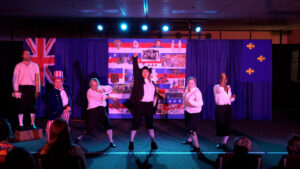
There were many maritime explorers in the Age of Exploration. One of the most famous was Christopher Columbus who sailed four times (1492) to the islands of Caribbean Sea. He thought he had reached Asia where he hoped to make a lot of money in the spice trade (cinnamon, nutmeg, ginger). But he didn’t arrive in Asia and didn’t find the spices. It’s a matter of historical record that he wasn’t very nice to the Taino and other people he encountered. And saying he ‘wasn’t very nice’ is an understatement. Christopher Columbus put a spotlight on the continents that were new to the Europeans, and it wasn’t long before regular European folk followed the explorers to settle in what became known as the Americas.
European Settlement: Jamestown and Plymouth
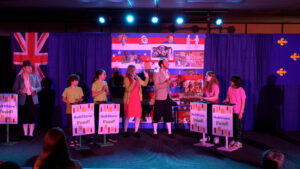
In the United States (or what would one day become the United States), the European settlers came mostly from France, Spain, and England. The English founded Jamestown in the south in 1607, and the Pilgrims came across the Atlantic in 1620 on the Mayflower to found Plymouth in the north. Jamestown was founded mostly to run businesses and make money. Plymouth was founded mostly for religious freedom.
These early settlers encountered the people who had been living here for thousands of years. Sometimes the interactions were peaceful, sometimes they were not. Our backdrop painting shows a Native American shaking hands with a settler. This is not always how it went.
Slavery
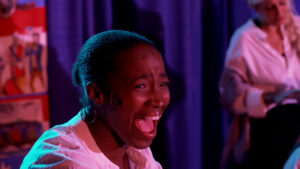
In 1619, a ship landed in Virginia carrying 20-30 people who had been kidnapped from Africa. These were the first enslaved people to arrive on the shores of America. Slavery lasted until the 13th Constitutional amendment was ratified in 1864. Much has been said on the topic of slavery, and the injustices and racism that came with it are still with us. In “The Revolutionary Revue” you will hear a song called, “Go Down to the River,” a bluesy spiritual that contains a coded message on how to escape to freedom.
A Bit of Vaudeville
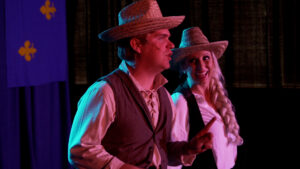
And now we meet Pete Larrabee and Wild Billy Jeen. They introduce the The Salem Witch Trial scene. These two come right out of Vaudeville, a form of entertainment you would have seen here in Portland a hundred years ago, when most entertainment will still live and in person–long before television, computers, and video. The joke in this scene is a play on the words ‘which’ and ‘witch.’ We won’t say more at this time about that–you’ll have to watch the show to find out.
The Salem Witch Trials
In 1692, the Parris family of Salem, Massachusetts owned a slave from the Caribbean. Her name was Tituba. Mystery surrounds this woman–we don’t know much about her. She apparently cooked for the Parris family and may well have also been a traditional healer in the community. One day eleven year-old Betty Parris accused Tituba of being a witch, which in those days was a serious accusation and not taken lightly. Betty accused others of witchcraft, and then other kids joined in, and adults as well.
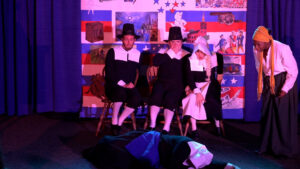
Soon Salem was in the grip of an all-out witch-hunt. Many people were accused, imprisoned, and put on trial. Tituba herself confessed to practicing witchcraft and accused others in turn of being witches, but she was never put on trial. Nineteen others were not so lucky–they were found guilty and hanged. There are lots of theories to explain the Salem Witch Trials, but no one knows for sure what caused this sad and deadly event to happen.
Fast Track to Independence: 1732-1776
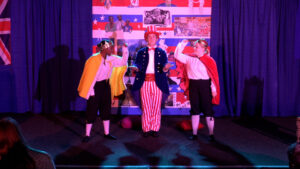
By 1732 there were 13 American colonies ruled by King George III, but France also had territory in the Americas; England and France each wanted the other to get out, so France got the Native Americans to fight with them against the English in what we remember today as the French and Indian War (1754-1763). The English beat the French, but wars are expensive and King George found himself with an empty bank account.
Taxation Without Representation
King George needed money–where could he get it? He decided to tax the American Colonies like they’d never been taxed before. That would solve his problem, right? Wrong. By 1763 the American Colonies had been doing their own thing for quite a long time and never had much interference from the homeland of England. But now–taxes! Lots of taxes! Taxes on just about everything. The Colonies weren’t crazy about this and tensions began to rise. They felt that if the King was going to tax them, then at the very least they deserved to have a representative in Parliament. They saw this as ‘taxation without representation.’
The Boston Massacre, or Possibly Incident
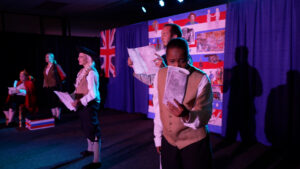
By 1770 things were getting hotter between the Colonies and King George. One day in Boston a crowd was heckling a group of British soldiers who then fired and killed five Colonists. This is remembered in England as the ‘Incident on King Street’ and in America as the ‘Boston Massacre.’ Here is a famous illustration made by Paul Revere.
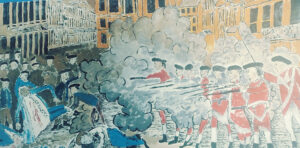
Many Americans saw this print and became even angrier at King George and England.
The Boston Tea Party
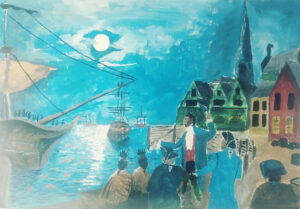
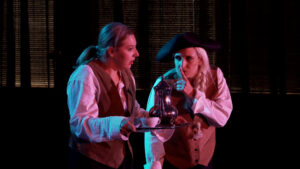
In 1773 a group of Colonists sneaked onto a boat in Boston Harbor and tossed 342 crates of tea overboard, worth over $1,000,000 in today’s prices. The Boston Tea Party was a political protest against the taxes and the lack of representation in Parliament. King George answered by imposing even harsher taxes and laws.
The Continental Congresses
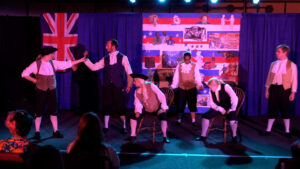
In 1774 and 1775 the Colonists formed the Continental Congresses to figure out what to do about the deteriorating situation with England. They wrote letters to King George asking him to play fair. King George got a good laugh out of that and sent more troops to the Colonies to put down the growing rebellion.
The Battle of Lexington and Concord and the Beginning of the War for Independence
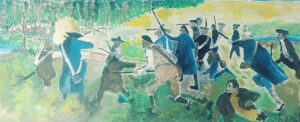
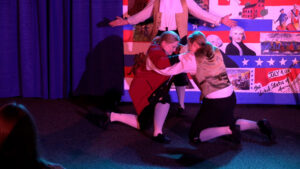
In 1775 the Colonists got word that British soldiers were on the march to destroy supplies of ammunition in Concord, Massachusetts.
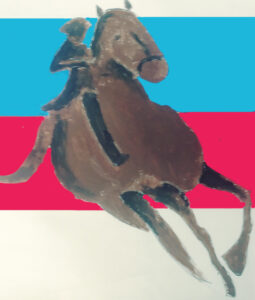
Paul Revere set off on his horse through the night to warn of the coming attack. The next day a small group of American militia called Minute Men met the much larger British regiment. Someone fired a shot (“The Shot Heard Round the World”) and the Battle of Lexington and Concord was on. The Americans were greatly outnumbered, but they won! Victory, yes, but it was just the first battle in the War for Independence.
Common Sense, the Declaration of Independence, and a New Nation is Born
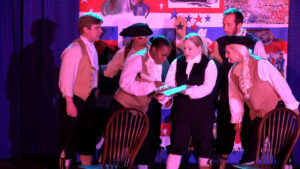
Not everyone wanted independence–many people were fine with being British if the leaders could just work something out and bring peace back.
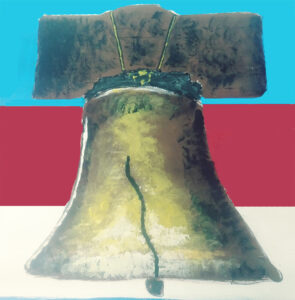
And then Thomas Paine wrote his book “Common Sense” that made a good argument for revolution and independence. Many Americans read that book and were convinced that the time had come for independence.
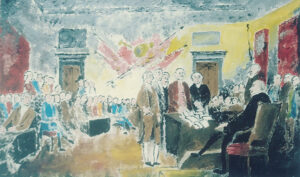
George Washington was appointed general of the armies and Thomas Jefferson wrote a letter to the world explaining why America was declaring independence and forming a new nation: The Declaration of Independence.
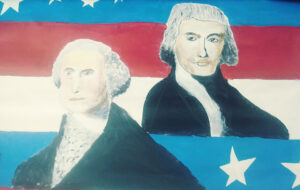
The United States of America was born on July 4, 1776–high fives all around!
And now let’s meet the people in the show.
Kristin Alarcon, performer, choreographer
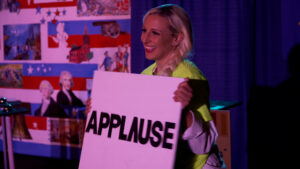
Where were you born? I was born in Portland, Oregon. What do you like about musical theater? I appreciate musical theater as a classic art form. In a world of screens at every turn, a live performance is as rare as it is impressive and entertaining! What is your day job? I am a high school teacher at Washington Connections Academy. Favorite hobby: Cosplay. I have created over two dozen full-scale costumes by hand! How long have you been acting? I have been doing musical theater ever since I was in Clackamas High School’s production of “Kiss Me Kate.” Something else about yourself...I also teach after-school drama classes. I own and operate a princess-party business, and I judge high school dance team competitions.
Liberty Dolence, performer
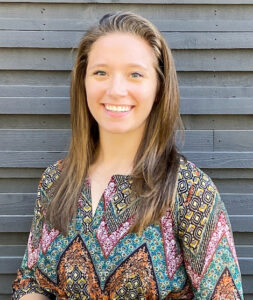
Liberty plays Christopher Columbus, Suzie Lovely, and the Town Crier.
Rachael Loop, performer, here as King George.
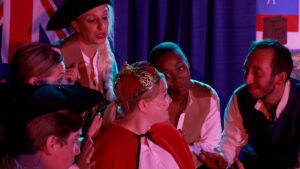
Where do you live? I live in Salem, Oregon. I ran around the country for awhile but ended up back home! What do you like about musical theater? I get to play with emotions and actions I don’t use much in my regular life. Plus I get to make other people laugh or cry with me, and everyone has a great time. What is your day job? I get to work at the Elsinore Theater. It’s decorated like a Shakespearean castle, and even when I’m just working with numbers I’m so happy to be there. Favorite t.v. show: I’m really into Star Trek lately. Captain Kathryn Janeway is my favorite! How long have you been acting? I started theater in the 5th grade! I got to be the Big Bad Wolf which was hilarious because I’m tiny. I fell in love with theater and have never looked back. Something else about yourself…I have a four-year-old who’s already cooler than me by far, and I have a cat who likes to sleep on my head. Any other advice? Try EVERYTHING. Even if your friend doesn’t think it’s cool, or you don’t know if that you’re that excited about it. If you’re a little bit interested, find a way to try it out–you never know what will turn out to bring you joy!
Lydia Fleming, performer
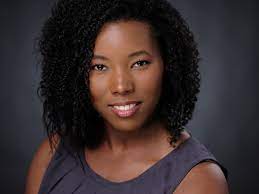
Lydia plays Tituba, George Washington, and sings the lead on
“Go Down to the River.”
Erik Montague, performer

Where were you born? I was born in Burlington, Vermont, but I grew up in Great Falls, Montana. What is your day job? I work as the Education Outreach Manager for Northwest Children’s Theater. What do you like about musical theater? I like musical theater because it’s a combination of all the arts: singing, dancing, acting, visual arts, set construction, orchestra…
Favorite movie: Spiderman. Favorite color: Burgundy. Favorite food: Burgers. Favorite Pokemon: Tyranitar. How long have you been doing musical theater? I have been acting since I was 13, which makes 18 years of my life. Something else about yourself…? I just got married in August to a fantastic lady named Leia. Also, I’ve been to 42 of the 50 states.
Austyn Stone, performer

Where did you grow up? I was born and raised in Norman, Oklahoma. What do you like about musical theater? Singing and dancing are such innately human forms of storytelling that have existed across all cultures essentially since the beginning of human-kind. I feel that’s something we’ve lost the joy of sharing in our modern society. I love sharing that love and joy with others. What is your Big Activity in life? I’m constantly working to be the best creative human I can be. I spend lots of time working on singing and dancing. My other creative endeavor is being a barista. I love making little cups of joy (whether it’s coffee, tea, hot cocoa, etc) Favorite show: My favorite show is Our Flag Means Death. It’s a great show about pirates. Something else about yourself… I’m a huge animal lover. I have a dog named Gnocchi who is my whole heart. How long have you been an artist? I’ve been a musician since I was young. I started with viola, and learned a little guitar. I started doing theatre in high school, and have been with it ever since.
Leander Hastings, director, pianist, music arranger

Leander is the director, pianist, vocal coach, orchestrator and arranger. There isn’t much he doesn’t do at Jester Educational Theater! He’s also a great chef and teaches voice and piano at his studio in S.E. Portland.
Katie Minter, stage manager. At a performance, she’s the boss. Katie makes sure everything is set up correctly and everyone knows what they’re supposed to do.

Where were you born/grew up? I grew up in Tigard. What do you like about musical theater? The friendships with cast and crew and hearing the audience’s response to the story. What is your job? I work at Starbucks. What is your favorite tv show? My favorite TV show is Seinfeld. Something else about you: I have a baby nephew whom I love to visit 🙂 How long have you been doing musical theater/drama/music? I started when I was 18 and am now almost 28, so about 10 years.
Yolanda Porter, assistant stage manager
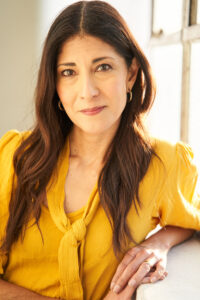
Where were you born? In Mexico, so I speak both English and Spanish. What do you like about musical theater? Everything! Telling stories with music is powerful and fun. What is your regular job? I do voice over and book narration from home. Favorite movie: Marvel. Favorite superheroes: Spiderman, Ironman, Black Panther, and Dr. Strange. Favorite t.v. shows: Stranger Things, Friends, Only Murders in the Building. Favorite hobby: Baking–shortbread and chocolate cake are my favorite. Favorite activity: I love watching movies! Something else about yourself… I have a daughter, a sweet chihuahua, and a mouse.
Mitch Iimori, woodwinds
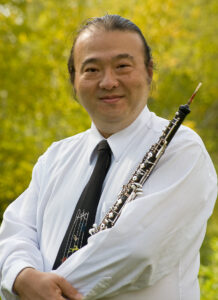
Mitch plays pretty much any and every wind instrument ever invented–56? 57? It’s hard to keep track. In “The Revolutionary Revue” you will hear him play the oboe, clarinet, flute, sax, and Indian flute. Mitch is from Japan and speaks Japanese.
Dan plays classical music and jazz.
Where were you born: I was born in Portland and grew up in Keizer. What do you like about musical theater? The many different kind of styles of music I get to play. What is your regular job? I am Program Position Manager for the Oregon Department of Human Services – I make sure our workers get paid. Favorite movie: The Truth About Cats & Dogs. Favorite musical: 7 Brides for 7 Brothers. Favorite color: Red. Favorite food: Anything pasta. Something else about you: I love learning new musical instruments–ukulele, electric bass! I also love to do abstract pour paintings with acrylic paint. My pets are fish and corals in a salt water aquarium. How long have you been doing musical theater? Since high school performing with musicals, but most always in the orchestra. I love acting and singing as well. I’ve been playing music since I was three and have played with many orchestras, both professional and community.
Kevin Muir, producer & show creator, and sound effects guy in the orchestra pit
Where were you born? I grew up in S.E. Portland. What is your job? Once upon a time I taught grade school for 32 years. Now I eat chocolate, do crosswords, and run a theater company. Life is good! What do you like about musical theater? What’s not to like about musical theater? I’m pretty obsessed with it–all of it. Favorite hobby: Playing piano, writing musicals, playing with dogs. How long have you been doing musical theater? This is our 8th season, but I was doing musicals with my grade school classes already many years ago. I believe that the arts are a great way to learn about yourself and the world, and I also believe that young people need live and in-person experiences, especially in the arts. That’s why I started Jester Educational Theater. I hope you enjoy the show!
